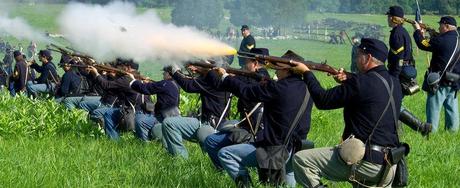
Union soldiers fire a volley at Confederate troops during re-enactment of the Battle of Gettysburg on June 28, 2013.
KAREN BLEIER/AFP/GETTY IMAGES MSNBC
The Deep South, Greater Appalachia and The Far West have the highest rates of deadly assault, but their legislators still resist stricter gun reforms. In April, 12 of the 14 Senators from the seven Deep South states voted against a background checks bill, which has since stunted gun reform progress. Woodard theorizes that this regional resistance among policymakers and populace depicts the historically rooted value on individual liberties and anti-interventionism. In the Deep South, the fight over slavery created an ongoing battle against federal powers and a deep strain of anti-federalism which lingers today. Likewise, Appalachia was founded by settlers from war-ravaged areas like Northern Ireland, Northern England and the Scottish Lowlands, where people grew familiar to violence as they struggled in a bloody fight for independence against the British. And in the Far West, its settlers were tied to Eastern powers that fought against outside Western intervention. The Northern regions like Yankeedom and The Midlands, however, experience less gun violence because of their peaceful and religious roots, according to Woodard. Yankeedom experiences less than two deaths per 100,000 people from gun violence each year and in its six states, 11 of the 12 senators voted in favor of expanded background checks in April.
